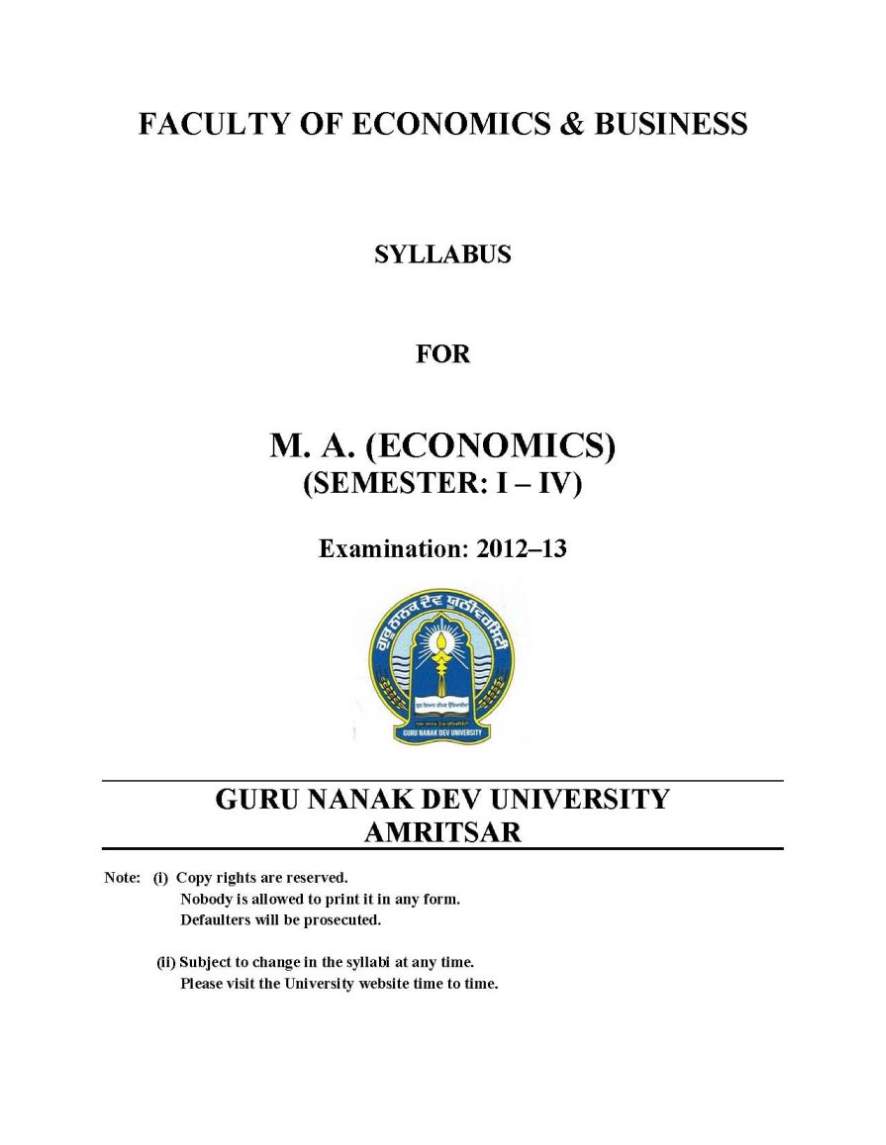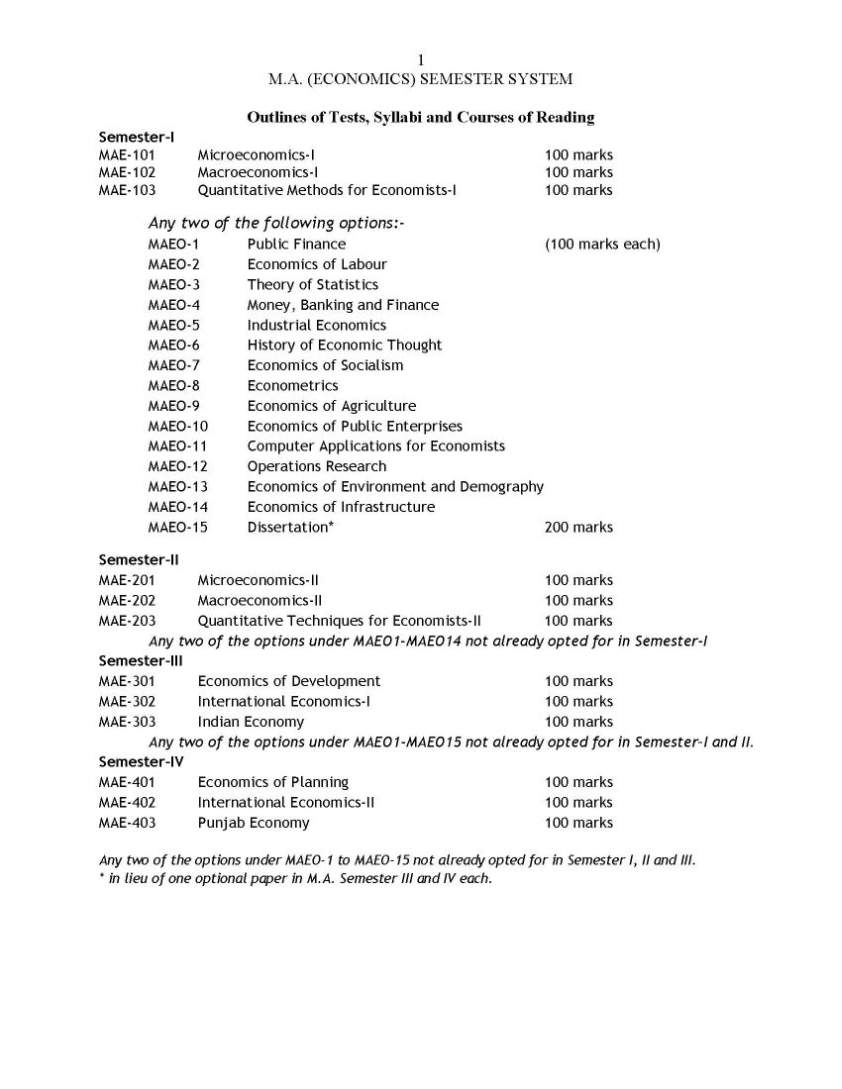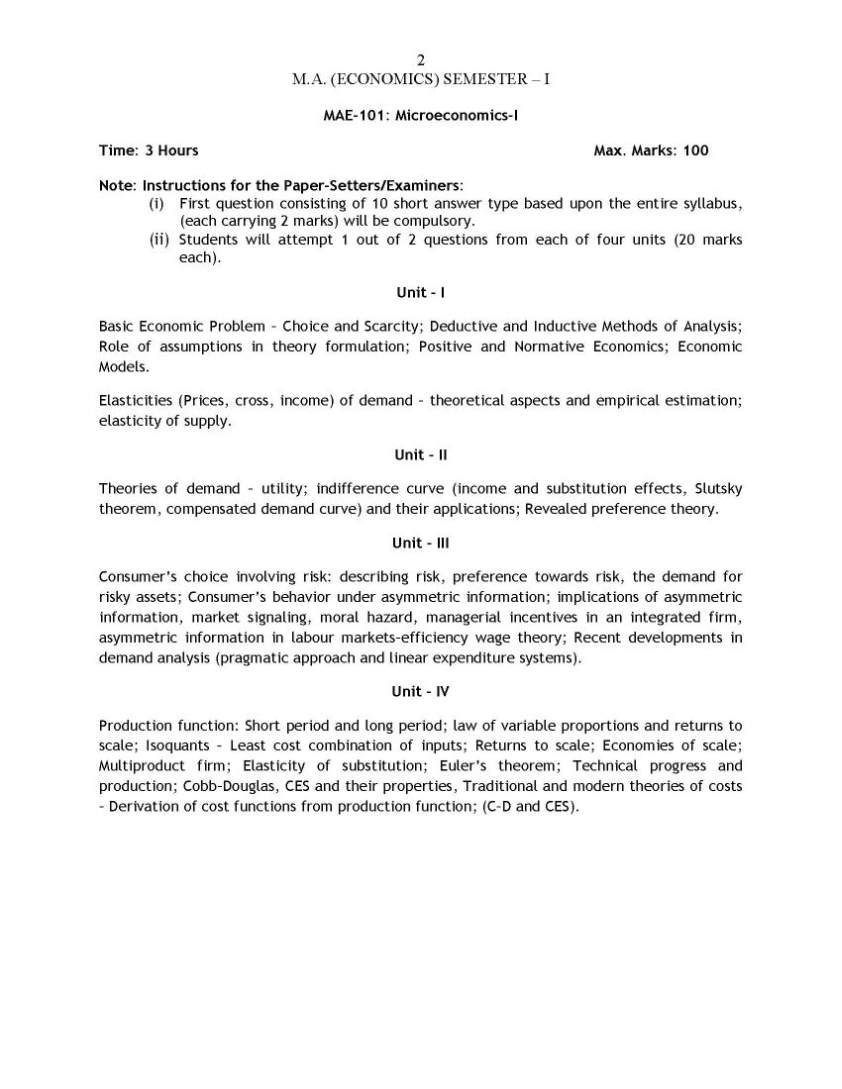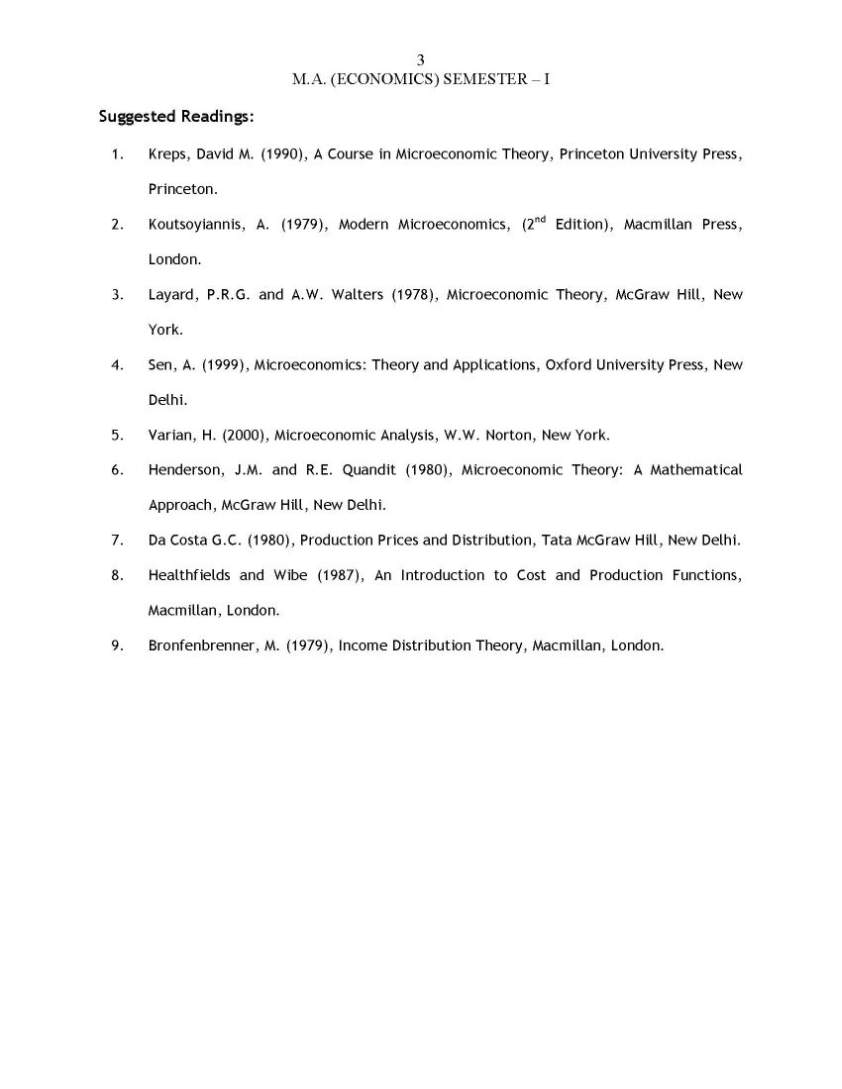Guru Nanak Dev University was established at Amritsar in1969. It is both a residential and an affiliating university. It imparts education and promotes research in the humanities, learned professions, sciences, especially of applied nature and technology.
M.A. (Economics)
Duration: 2 Years
Eligibility: Graduation or Equivalent
Course Details
Part-I:
I. Microeconomics
II. Macroeconomics
III. Quantitative Methods for Economists
IV&V. Any two of the following Options
i) Public Finance
ii) Economics of Labour
iii) Theory of Statistics
iv) Money, Banking and Finance
v) Industrial Economics
vi) History of Economic Thought
vii) Economics of Socialism
viii) Econometrics
ix) Economics of Agriculture
x) Economics of Public Enterprises
xi) Computer Applications for Economists
xii) Operation Research
xiii) Economics of Environment and Demography
xiv) Economics of Infrastructure
Part-II:
Economics of Development & Planning
International Economics
Indian Economy & Punjab Economy
Paper-IX & X
Paper-IX. Thesis and Paper-X any one of the options given under Paper-IV and V (i-xiv) not already opted in M.A. Economics Part-I. OR
Any two options not already opted under Paper-IV & V (i-xiv) in M.A. Economics Part-I
M.A Economics in GNDU Sullabus
M.A. (ECONOMICS) SEMESTER SYSTEM
Outlines of Tests, Syllabi and Courses of Reading
Semester-I
MAE-101 Microeconomics-I 100 marks
MAE-102 Macroeconomics-I 100 marks
MAE-103 Quantitative Methods for Economists-I 100 marks
Any two of the following options:-
MAEO-1 Public Finance (100 marks each)
MAEO-2 Economics of Labour
MAEO-3 Theory of Statistics
MAEO-4 Money, Banking and Finance
MAEO-5 Industrial Economics
MAEO-6 History of Economic Thought
MAEO-7 Economics of Socialism
MAEO-8 Econometrics
MAEO-9 Economics of Agriculture
MAEO-10 Economics of Public Enterprises
MAEO-11 Computer Applications for Economists (Th.: 80+
Pr.: 20) = 100 Marks
MAEO-12 Operations Research
MAEO-13 Economics of Environment and Demography
MAEO-14 Economics of Infrastructure
MAEO-15 Dissertation* 200 marks
Any two of the options under MAEO-1 to MAEO-15 not already opted for in Semester I, II and III.
* in lieu of one optional paper in M.A. Semester III and IV each.
M.A. (ECONOMICS) SEMESTER SYSTEM
Outlines of Tests, Syllabi and Courses of Reading
SEMESTER-II
MAE-201 Microeconomics-II 100 marks
MAE-202 Macroeconomics-II 100 marks
MAE-203 Quantitative Techniques for Economists-II 100 marks
NOTE: Any two of the options under MAEO1-MAEO14 not already opted for in
Semester-I
Any two of the following options:-
MAEO-1 Public Finance (100 marks each)
MAEO-2 Economics of Labour
MAEO-3 Theory of Statistics
MAEO-4 Money, Banking and Finance
MAEO-5 Industrial Economics
MAEO-6 History of Economic Thought
MAEO-7 Economics of Socialism
MAEO-8 Econometrics
MAEO-9 Economics of Agriculture
MAEO-10 Economics of Public Enterprises
MAEO-11 Computer Applications for Economists (Th.: 80+
Pr.: 20) = 100 Marks
MAEO-12 Operations Research
MAEO-13 Economics of Environment and Demography
MAEO-14 Economics of Infrastructure
MAEO-15 Dissertation* 200 marks
M.A. (ECONOMICS) SEMESTER SYSTEM
Outlines of Tests, Syllabi and Courses of Reading
SEMESTER-III
MAE-301 Economics of Development 100 marks
MAE-302 International Economics-I 100 marks
MAE-303 Indian Economy 100 marks
NOTE: Any two of the options under MAEO1-MAEO15 not already opted for in
Semester–I and II.
Any two of the following options:-
MAEO-1 Public Finance (100 marks each)
MAEO-2 Economics of Labour
MAEO-3 Theory of Statistics
MAEO-4 Money, Banking and Finance
MAEO-5 Industrial Economics
MAEO-6 History of Economic Thought
MAEO-7 Economics of Socialism
MAEO-8 Econometrics
MAEO-9 Economics of Agriculture
MAEO-10 Economics of Public Enterprises
MAEO-11 Computer Applications for Economists (Th.: 80+
Pr.: 20) = 100 Marks
MAEO-12 Operations Research
MAEO-13 Economics of Environment and Demography
MAEO-14 Economics of Infrastructure
MAEO-15 Dissertation* 200 marks
M.A. (ECONOMICS) SEMESTER SYSTEM
Outlines of Tests, Syllabi and Courses of Reading
SEMESTER-IV
MAE-401 Economics of Planning 100 marks
MAE-402 International Economics-II 100 marks
MAE-403 Punjab Economy 100 marks
NOTE: Any two of the options under MAEO-1 to MAEO-15 not already opted for in
Semester I, II and III.
• In lieu of one optional paper in M.A. Semester III and IV each.
Any two of the following options:-
MAEO-1 Public Finance (100 marks each)
MAEO-2 Economics of Labour
MAEO-3 Theory of Statistics
MAEO-4 Money, Banking and Finance
MAEO-5 Industrial Economics
MAEO-6 History of Economic Thought
MAEO-7 Economics of Socialism
MAEO-8 Econometrics
MAEO-9 Economics of Agriculture
MAEO-10 Economics of Public Enterprises
MAEO-11 Computer Applications for Economists (Th.: 80+
Pr.: 20) = 100 Marks
MAEO-12 Operations Research
MAEO-13 Economics of Environment and Demography
MAEO-14 Economics of Infrastructure
MAEO-15 Dissertation* 200 marks
M.A. (ECONOMICS) SEMESTER – I
MAE–101: Microeconomics–I
Time: 3 Hours Max. Marks: 100
Note: Instructions for the Paper–Setters/Examiners:
(i) First question consisting of 10 short answer type based upon the entire syllabus,
(each carrying 2 marks) will be compulsory.
(ii) Students will attempt 1 out of 2 questions from each of four units (20 marks each).
Unit – I
Basic Economic Problem – Choice and Scarcity; Deductive and Inductive Methods of Analysis;
Role of assumptions in theory formulation; Positive and Normative Economics; Economic
Models.
Elasticities (Prices, cross, income) of demand – theoretical aspects and empirical estimation;
elasticity of supply.
Unit – II
Theories of demand – utility; indifference curve (income and substitution effects, Slutsky
theorem, compensated demand curve) and their applications; Revealed preference theory.
Unit – III
Consumer’s choice involving risk: describing risk, preference towards risk, the demand for risky
assets; Consumer’s behavior under asymmetric information; implications of asymmetric
information, market signaling, moral hazard, managerial incentives in an integrated firm,
asymmetric information in labour markets–efficiency wage theory; Recent developments in
demand analysis (pragmatic approach and linear expenditure systems).
Unit – IV
Production function: Short period and long period; law of variable proportions and returns to
scale; Isoquants – Least cost combination of inputs; Returns to scale; Economies of scale;
Multiproduct firm; Elasticity of substitution; Euler’s theorem; Technical progress and
production; Cobb–Douglas, CES and their properties, Traditional and modern theories of costs –
more syllabus detail to atteched in a pdf file;



